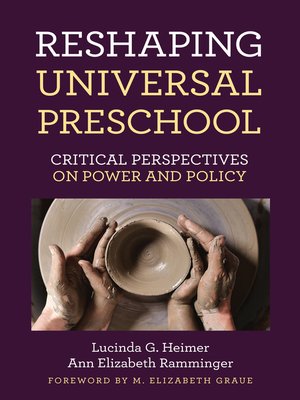Reshaping Universal Preschool
ebook ∣ Critical Perspectives on Power and Policy · Early Childhood Education Series
By Lucinda G. Heimer

Sign up to save your library
With an OverDrive account, you can save your favorite libraries for at-a-glance information about availability. Find out more about OverDrive accounts.
Find this title in Libby, the library reading app by OverDrive.



Search for a digital library with this title
Title found at these libraries:
| Library Name | Distance |
|---|---|
| Loading... |
This is a comprehensive, detailed account of the complex state of Universal Preschool (UPK) in the United States. As discussions regarding access, equity, and the societal value of early childhood education enter into the public forum, this book offers critical perspectives for next steps. The authors join the synergy of wonder to the practicality of wisdom to navigate complicated systems of power, relationships, and discourse. Cross-sector efforts to address planning and implementation of UPK are examined while acknowledging the current inequitable nature of the field. The book is a cautionary tale that includes historical and current vignettes showing that some issues in UPK collaboratives are constant across time. To bring the discussion alive, a variety of stakeholder perspectives offer insights into the "why" behind policy decisions. Reshaping Universal Preschool will help stakeholders explore, reflect, and apply lessons learned to existing or potential UPK collaborative efforts.
Book Features:
- Honors and illustrates perspectives from the participants—families, teachers, support staff, administrators, researchers, and policymakers.
- Considers the complicated nature of perceived power among stakeholders.
- Offers pragmatic suggestions to consider while engaging in policy changes that affect early childhood practice.
- Provides insight on collaborative practices building up from early education to the larger educational context.
- Contains reflective questions to help readers apply the research and concepts to their own practice, situation, and communities.







